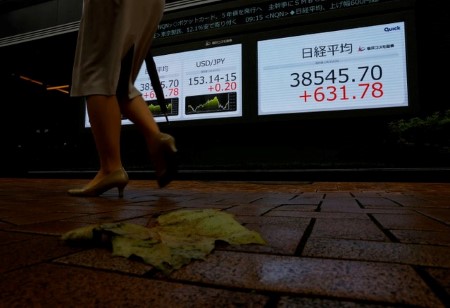




January Economic Update: Growth slows, prices rise
 DOWNLOAD
DOWNLOAD

Inflation Update: Up, up, and away?
 DOWNLOAD
DOWNLOAD

Quarterly Economic Growth Release: Growth takes on a slower pace
 DOWNLOAD
DOWNLOAD


Japan bourse’s activist clash is a welcome sign

HONG KONG – By the standards of sharper-elbowed markets, the recent dust-up between activist investor Strategic Capital and the Tokyo Stock Exchange is positively mild. For Japan’s historically sleepy stock market, however, it’s a sign of progress for what remains a relatively young and underdeveloped activist ecosystem.
The short version of the clash, reported on June 9 by news outlet Toyo Keizai, goes like this: until recently, if a foreign investment fund held more than 10% of a Japanese stock and didn’t file paperwork confirming itself as having multiple backers, the exchange considered those holdings illiquid. Tokyo-based Strategic Capital built up a stake of over 10% in Osaka Steel 5449.T via its own foreign fund, but chose not to file said paperwork.
That pushed the free float of the Nippon Steel subsidiary below the threshold to remain listed, putting pressure on the parent to acquire the “child” listing and lining up a nice payout for Osaka Steel’s minority shareholders.
The gambit looked pretty clever until April 23, when the bourse issued guidance stating such shares would now be considered liquid by default, even without the paperwork. Cue an announcement from Osaka Steel that its free float suddenly met the minimum — and frustration from Strategic Capital, which penned a letter of complaint to the stock exchange.
It is still early days for activism in Japan, which makes such conflicts valuable in setting ground rules and expectations. The upshot of this spat for market participants is twofold: for one, the specific tactic deployed on Osaka Steel won’t work in the future, and more generally, the bourse probably won’t look favorably on activists trying to force delistings via a technicality.
Yet Osaka Steel, which trades at just 79% of book value, per LSEG, looks very much like the sort of underperforming “child” listing the exchange says it wants done away with. If it makes a habit of scotching activist strategies at will, the bourse risks undermining its broader strategy of using market forces to push listed groups to streamline governance and boost returns.
On its own, however, the recent move looks unlikely to do serious damage. Pressure from activists has already helped spur record year-to-date share buybacks of more than 12 trillion yen, according to figures from Nomura. And with a record 50 Japanese companies facing activist proposals this earnings season, per Nikkei Asia, there will be plenty of action in the coming weeks. Expect more wrinkles to get ironed out as the parties involved hammer out where the lines are. All for the better.
CONTEXT NEWS
Strategic Capital, a Tokyo-based activist investor, penned a letter of complaint to the Tokyo Stock Exchange after guidelines announced by the bourse in late April changed how it determined the liquidity of shares held by foreign investment funds, Japanese business magazine Toyo Keizai reported on June 9.
The change recategorized a stake of over 10% in Osaka Steel held by Strategic Capital via a foreign investment fund as liquid, pushing the free float of the Nippon Steel subsidiary back above the 25% threshold to remain listed on the exchange’s Standard Market.
(Editing by Antony Currie; Production by Ujjaini Dutta)
This article originally appeared on reuters.com





 By Reuters
By Reuters